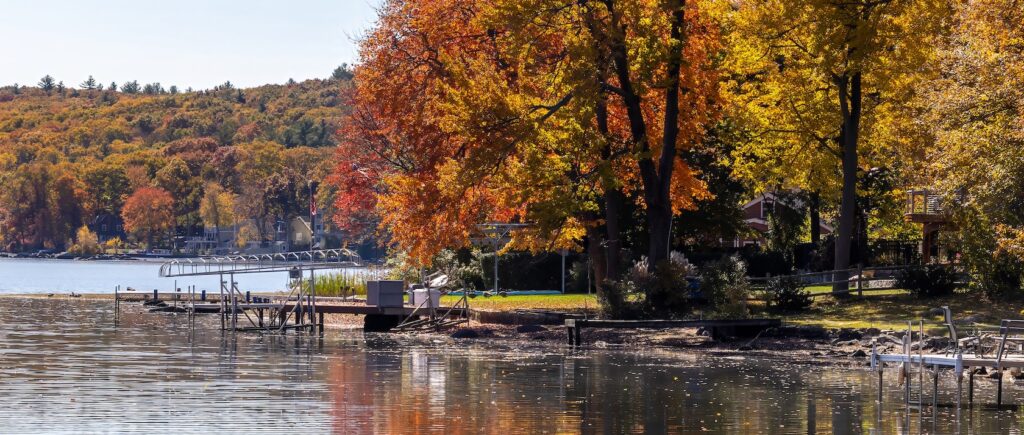At its meeting Monday night, the Planning Board chastised the proponents of two major projects that have dragged on for years to get their plans promptly in order, including the Grasshopper Energy solar array’s planting plan.
Grasshopper Energy’s 2.4-megawatt commercial solar farm between Wilson Street and Cedar Street evoked the most vocal criticism from Planning Board members. The applicant came before the board with an amended special permit application to address landscaping and screening modifications the board requested previously.
Electrical engineer Chris Balogh explained that his firm “jumped the gun” by proceeding with a screening planting plan that veered from the original plan without appearing before the board beforehand. He requested its input on how to “provide optimal screening” for the abutters of the solar voltaic array. There are three areas of the property that he wanted to address.
“The original plan didn’t provide a lot of details into how to plant the trees or where to plant the trees,” he said. Later in the discussion, the applicant noted that the planting plan was provided by the previous solar developer and approved by the board, but it was not feasible to implement for Grasshopper because it wouldn’t provide optimal screening. Balogh proposed putting larger trees on the northern section of the property.
“As a board, we certainly look at what was committed to and recognize that there are times when things need to be changed,” said chair Gary Trendel. He noted that Wilson Street is a scenic road, and its character needs to be maintained.
As the hearing went on, Trendel and other members made it clear that it was not the board’s responsibility to provide what the exact plantings need to be. Those decisions would fall upon a landscape architect. When Balogh said he needed direction from the abutters as to the plantings they would want, Trendel noted that they already have been “explicit” during this process.
Principal Planner John Gelcich explained that the original special permit was issued in 2019, and the amended one was issued in 2021 for the layout of the solar panels “but not for landscaping.” He noted that the initial plans “did not indicate which species were going where” and that native plantings must be used.
“They promised — and we put in the conditions — that before any plantings were done, they would have to come back to me to review the plan before they planted them to see what was changed,” he said. “They did not do that.”
Instead, he explained, “they planted a significant reduced amount of plantings that were almost only arborvitae.”
“The argument from the applicant was, ‘Well, we can’t actually plant the plan that was approved,’ ” Gelcich continued, “which was really frustrating because it was the applicant’s plan.” Grasshopper submitted the exact planting plan that the previous owner proposed.
“It’s up to you,” Trendel told Balogh about updating the plan. “You know, we’re not the design group here.”
What further jolted committee members was when Gelcich said Grasshopper has been “generating energy and I assume generating revenue” while not receiving final approval of the plans from the board first.
Gelcich explained that while it was believed that the company could not do that until obtaining a certificate of occupancy, it is legal for Grasshopper to connect to the solar array without town approval.
Ahmed Hafez, representing Grasshopper, confirmed to the board that it is “connected to the grid and generating energy now.”
“I’m rather perplexed as to how this can be happening without us releasing the applicant of its requirements,” said board member Ron Priefer, noting that he was “rather taken aback” at hearing the news.
Hafez explains that a certificate of completion is required for operation — not a certificate of occupancy. He added that the company is “committed to completing all our obligations.” He encouraged the board to schedule a site visit to talk about the plantings.
Said Trendel: “It’s worth noting that there is still action that the Planning Board can take.”
The current special permit could be revoked, which could trigger a decommissioning of the site, he explained. But right now the applicant “is following the correct path” by working on an amended screening planting plan.
Trendel added that while Grasshopper has continued to seek the board’s input, its recommendations have failed to be implemented in what he said has become “a challenging and frustrating process.”
Other members echoed these concerns. Vice chair Mary Larson-Marlowe said the board should be asked to conduct a site walk once the landscaping plan is produced rather than before.
“We cannot design this for you,” she stressed. “We have indicated what the outcome must be. And the outcome must be that this facility is screened in its entirety from abutters.”
Larson-Marlowe noted that the battery connection boxes should not be visible. Member Jane Moran added that “they are really ugly from the street.” Balogh replied that screening them would require an adjustment of the street to make room for the trees.
The hearing was continued until the next meeting on Feb. 27 to give the applicant time to develop a detailed plan with renderings of three areas of concern.
The Trails hearing continued after sidewalk talk
The other ongoing project that appeared to frustrate the board was the open space mixed use development plan for The Trails development. This hearing also was continued until the next meeting.
Peter Bemis, the project’s engineering consultant, appeared before the board regarding the 55-and-over housing development located off Legacy Farms North Road. He previously had been told repeatedly by both the Planning Board and the Conservation Commission that he needed to provide more information to address their concerns.
Bemis explained to the board that he provided an updated plan and response package to BETA Group, the town’s engineering consultant, on Thursday. BETA previously had requested that several items be addressed on stormwater management.
“I will assure you that each item was addressed on the plan set with either some modification to address a BETA comment or some other refinement to address a board comment,” he said. He noted that the planting replication plan along Wilson Street appeared to be the board’s major concern. In response, there is now “a native planting scheme.”
Bemis said he wanted to discuss the sidewalks. He noted that during a homeowners association meeting, some residents said there was no need for them. Two residents brought up that the curb would hinder snowplowing and not be as aesthetically pleasing as grass.
“From my perspective as a designer, I don’t want to eliminate them,” he said. “I think sidewalks are there for making travel ways friendly for pedestrians.”
Bemis proposed a “modified Cape Cod sidewalk” because he didn’t like the grass strip. His alternative was an upright asphalt curb along the edge of a raised 5-foot sidewalk. There would be a small grass plot abutting the houses. The curb would prevent vehicles from going onto the sidewalk, he explained.
Members agreed that a sidewalk was preferable to grass, but they disagreed about the necessity of the grass strip.
Gelcich noted that the grass strip was factored into the stormwater calculations. BETA would need to review the plan.
“We’ve been kicking the can on this project for a while now,” Trendel said. “I’d really, really like to see you work with BETA and resolve the open questions that they have before you come back to us. I’m starting to lose some patience here.”




















0 Comments